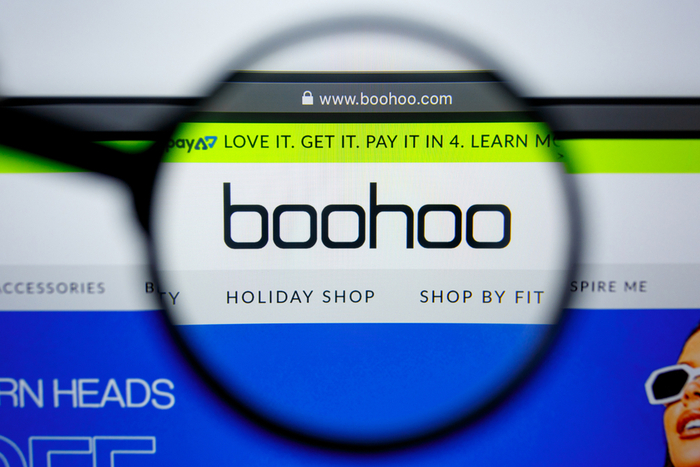The retail industry has been left wondering what the future has in store for Boohoo Group, a booming fast fashion company that recently posted annual sales of £1.23 billion, after its Leicester factory was accused of modern slavery.
A Sunday Times investigation earlier this month saw the online fashion giant embroiled in controversy over allegations that its Leicester factory was paying garment workers as little as £3.50 an hour. The factory in question was also accused of reportedly “forcing” workers to come into work even while sick with Covid-19, despite the city recently being dragged back into a local lockdown.
To add to the controversy, a report from labour group Labour Behind the Label alleged that Leicester textile factories, primarily producing for Boohoo Group, did not adhere to social distancing measures.
The group, which owns the likes of Boohoo, PrettyLittleThing, Nasty Gal, Karen Millen and Oasis & Warehouse, quickly went into damage control and launched an investigation into the allegations. On the other hand retail giants Next, Asos and Zalando dropped Boohoo from their websites until the investigation concluded.
With Boohoo’s target audience being as young as 16 years old, speculation has arising as to whether the young demographic’s loyalty towards the brand would be affected by the modern slavery allegations. Some experts argue that such accusations could permanently damage a brand’s reputation.

However, the modern slavery accusation isn’t the only attack Boohoo has faced this year.
Despite Boohoo’s fruitful start to the year piggybacking several years of growth, the retailer’s performance took a downturn in May when it came under attack by British short-seller Shadowfall for overstating its free cashflow by £32.2 million. Shares in Boohoo fell by more than 12 per cent after the investor revealed it had bet on a share price fall.
News then emerged that Boohoo was facing an £81 million lawsuit in the US over allegations it misled shoppers with “sham sales”.
Meanwhile last month Boohoo was criticised by investors for the operation and timing of its new bonus scheme, which could see its executives receive a share of a £150 million bonus payout.
Rob Coleridge, senior associate at law firm Irwin Mitchell, said assessing the impact of modern slavery allegations on young audiences was difficult.
“What impact the news will have on young audiences with a growing social conscience, not to mention ethical investors remains to be seen,” he told Retail Gazette.
“While Boohoo has taken immediate steps to investigate the allegations, they have already suffered significant reputational and financial damage.
“The most serious risk is likely to be reputational but events like this can also be an opportunity to learn lessons and improve the company’s image.”

Oliver Guy, senior industry director at Software AG, said younger demographics were usually more aware of how companies operate because they want to buy from brands that resonate with their core values.
“Simply stocking Boohoo’s products is seen by many as a breach of the ‘brand promise’,” he explained.
“This highlights how any involvement in unethical production can lead to reputational repercussions.”
Although the scandal has led to Boohoo shares dropping by 20 per cent, head of marketing Ele Ward of tech platform CoGo said it does not wave goodbye to Boohoo nor knocks them off, especially since it houses multiple brands and online fascias under its name. She also believes the firm as seemingly brushed the scandal under the carpet already.
“The hope we can take from these findings is that consumers are speaking up and are angry, and this isn’t just a cohort of wealthy consumers who can afford to go elsewhere,” Ward said.
“Boohoo has already suffered significant reputational damage”
“With the story translating beyond to their young savvy following, this shows that consumer call for sustainability in fashion is not a PR stunt, it needs to be a given.”
Ward added that now is the time for all attention to be drawn to the way Boohoo’s management reacted – similarly to what was seen with Sir Philip Green in the fall of BHS.
As a result of the scandal, Next and Asos were among the first companies to stop selling Boohoo items on their websites, saying they were looking for an “answer”. This could lead to reduced sales and has already caused steep falls in the Boohoo’s share price.
Andy Barr, retail expert and co-founder of online price tracking site Alertr, said supply chains such as Asos and Zalando feature not only their own clothes, but a mix of other high street and designer brands in order to offer a “one-stop shop” for loyal customers.
“By previously stocking Boohoo products on its sites, it could be interpreted by some that these brands were either somehow complicit or aware of the scandal, or that they could also be running similar operations themselves within their own factories,” he told Retail Gazette.
“Of course, by removing Boohoo as a stockist, these sites risk some loss of sales as there will no doubt still be high demand for the kind of fast fashion the brand offers, but it won’t be nearly as damaging as the potential PR consequences of staying associated with them.
“The scandal does not wave goodbye to Boohoo”
“Considering Mahmud Kamani is a multi-billionaire, there is every chance that his wealth and access to the best crisis communications advisors’ money can buy will be able to help him out of this sticky situation.”
Barr added that there would likely be future collaborations with ethically-minded celebrities or influencers in campaigns once the noise surrounding the modern slavery scandal has died down further.
There is still a huge demand for fast fashion so despite the fall backs, there is a possibility that Boohoo could come back a stronger than before. But other retailers should still take this as a wake-up call and expect to see rivals announce changes to their supply chains.
Quite simply, for retailers to learn from and avoid such a scandal, they should ensure that workers in their supply chains are not being exploited.
In Boohoo’s case, its target customers may continue to shop with it for no other reason than for convenience, while its older but less common target audience may shop with it if the high street still feels inaccessible during Covid-19.
More importantly though, Boohoo investors will be searching for both transparency and concrete action following the results of the investigation.
Click here to sign up to Retail Gazette‘s free daily email newsletter

















